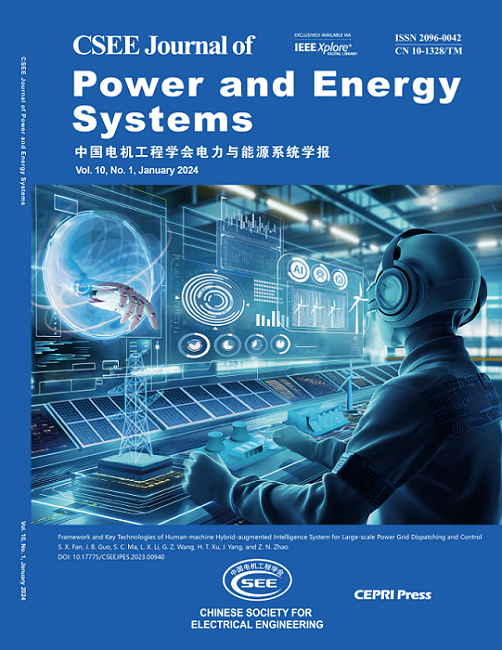考虑有限理性的区域综合能源系统集群优化层次博弈法
IF 6.9
2区 工程技术
Q2 ENERGY & FUELS
引用次数: 0
摘要
区域综合能源系统(RIES)集群,即多源集成和多区域协调,是提高能源利用效率的有效方法。区域综合能源系统集群的分层结构和有限的信息共享使得传统博弈论难以准确描述其博弈行为。因此,本文提出了一种考虑有界理性的分层博弈方法,以平衡在隐私保护下优化 RIES 集群的利益。以集群操作员(CO)为领导者,多个 RIES 为追随者的 Stackelberg 博弈,可同时优化领导者的利益和 RIES 的利用效率。同时,还引入了一个轻微的利他主义函数来模拟每个 RIES 代理是否合作的博弈行为。通过在下层引入基于有界理性的演化博弈,可以避免假设参与者完全理性的缺陷。特别的是,在自主优化调度时,每个 RIES 都被视为一个专业消费者,可以灵活转换其市场参与角色,以实现集群协调优化。对 RIES 集群的案例研究验证了所提方法的有效性。本文章由计算机程序翻译,如有差异,请以英文原文为准。
Hierarchical Game Approach for Optimization of Regional Integrated Energy System Clusters Considering Bounded Rationality
Regional integrated energy system (RIES) cluster, i.e., multi-source integration and multi-region coordination, is an effective approach for increasing energy utilization efficiency. The hierarchical architecture and limited information sharing of RIES cluster make it difficult for traditional game theory to accurately describe their game behavior. Thus, a hierarchical game approach considering bounded rationality is proposed in this paper to balance the interests of optimizing RIES cluster under privacy protection. A Stackelberg game with the cluster operator (CO) as the leader and multiple RIES as followers is developed to simultaneously optimize leader benefit and RIES utilization efficiency. Concurrently, a slight altruistic function is introduced to simulate the game behavior of each RIES agent on whether to cooperate or not. By introducing an evolutionary game based on bounded rationality in the lower layer, the flaw of the assumption that participants are completely rational can be avoided. Specially, for autonomous optimal dispatching, each RIES is treated as a prosumer, flexibly switching its market participation role to achieve cluster coordination optimization. Case studies on a RIES cluster verify effectiveness of the proposed approach.
求助全文
通过发布文献求助,成功后即可免费获取论文全文。
去求助
来源期刊

CSEE Journal of Power and Energy Systems
Energy-Energy (all)
CiteScore
11.80
自引率
12.70%
发文量
389
审稿时长
26 weeks
期刊介绍:
The CSEE Journal of Power and Energy Systems (JPES) is an international bimonthly journal published by the Chinese Society for Electrical Engineering (CSEE) in collaboration with CEPRI (China Electric Power Research Institute) and IEEE (The Institute of Electrical and Electronics Engineers) Inc. Indexed by SCI, Scopus, INSPEC, CSAD (Chinese Science Abstracts Database), DOAJ, and ProQuest, it serves as a platform for reporting cutting-edge theories, methods, technologies, and applications shaping the development of power systems in energy transition. The journal offers authors an international platform to enhance the reach and impact of their contributions.
 求助内容:
求助内容: 应助结果提醒方式:
应助结果提醒方式:


